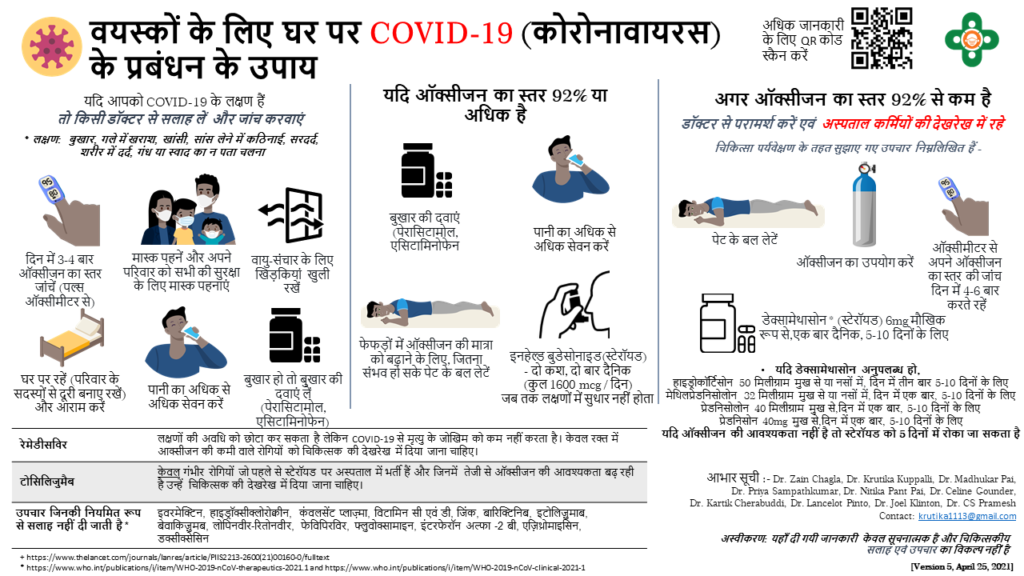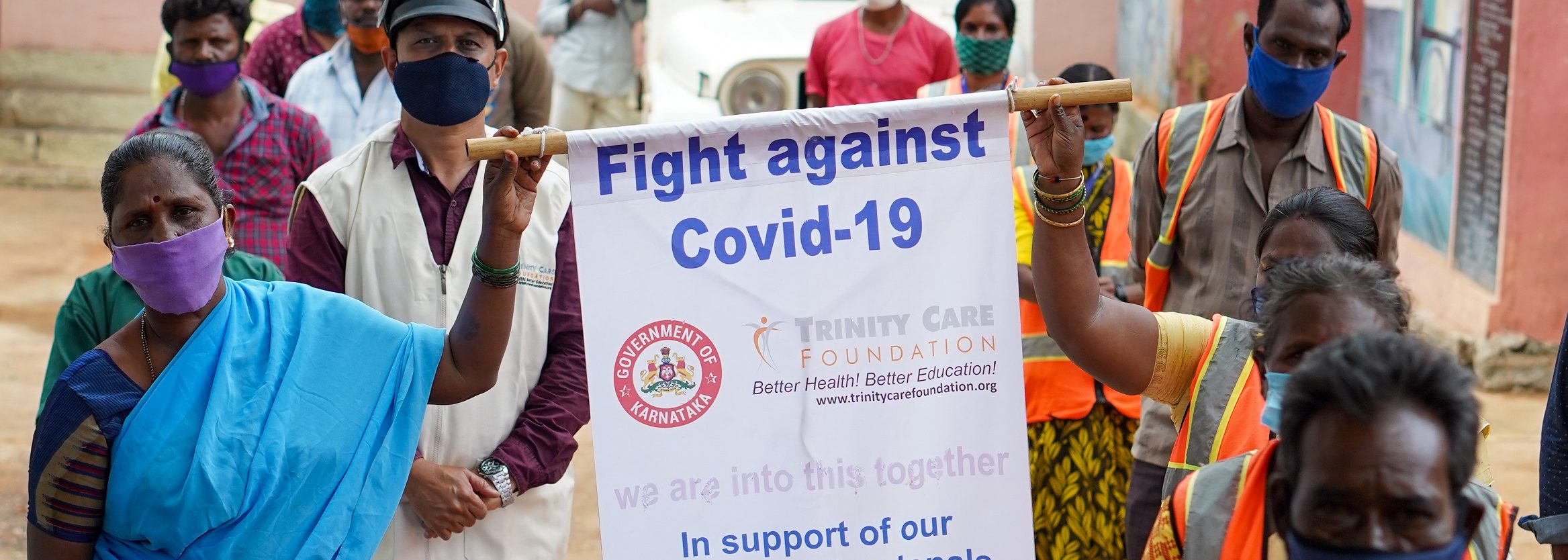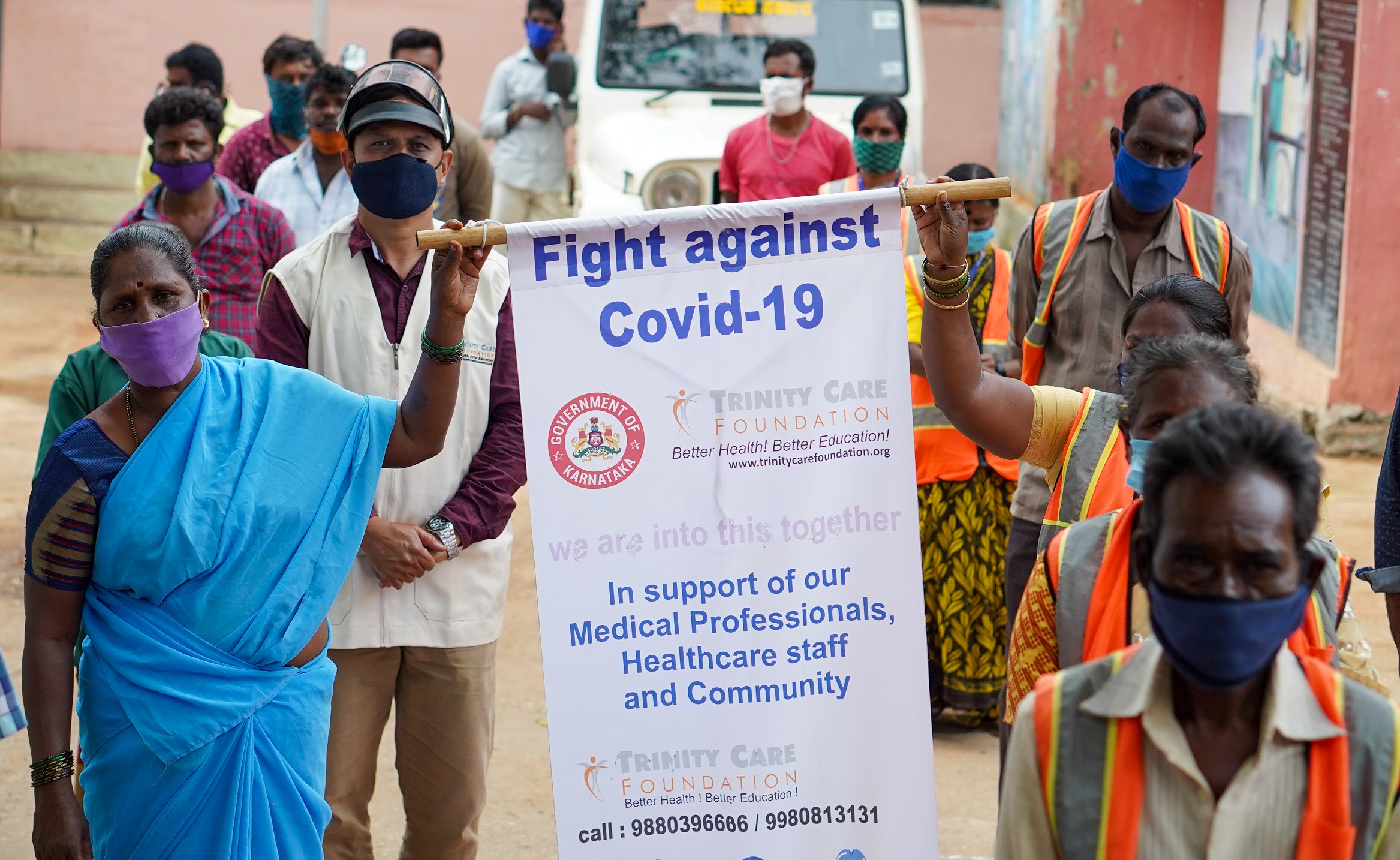Published: 05/05/2021
This page was developed to support India during the COVID-19 surge in the spring of 2021. More updated, globally applicable content can be found here.
Stanford faculty, many of whom have close personal and professional ties to India, have been hard at work building solutions, compiling resources, and communicating essential information. Working closely with Dr. Nidhi Rohatgi, we have compiled a comprehensive list of vetted public resources developed at Stanford for families and healthcare workers in India struggling to treat patients and loved ones.
Below is a list of various resources for in-home treatment, low-resource ICU guides and protocols, and trainings for healthcare workers without COVID-19 experience. Additionally, for those outside of India eager to offer assistance and aid from afar, we have compiled a list of vetted organizations urgently acting to address the crisis.
Answers to questions from Stanford-India COVID-19 Q&A webinar on May 12-13, 2021
In this document, a panel of Stanford Medicine faculty who participated in the first Stanford-India COVID-19 Q&A webinar provide answers to additional questions that were sent by the attendees. Thanks again to >8500 people who registered for this event and sent us >1700 questions. We answered several of these questions during the webinar, several of them were answered in the chat by us during the live webinar, and here we provide answers to a few more. These are general considerations for educational purposes and do not replace the recommendations and clinical judgment of the local doctors.
Resources for at-home care
- India COVID SOS: Clear and easy-to-follow guides for at-home treatment of COVID-19 patients, available in 20 different languages commonly used in India. including recommended strategies for protecting other family members from the virus. Spearheaded by Global Health Faculty Fellows Manu Prakash, PhD, and Anurag Mairal, PhD.
- Home oxygen weaning protocol: Guidelines to help families wean receiving loved ones off of supplemental oxygen.
- Managing COVID-19 in India – Breaking through the myths and caring at home: A FAQ intended for families and non-medical professionals answering a wide range of questions relating to COVID-19, including symptoms, severity, myths, treatments, vaccine info, and much more. Created by Stanford Faculty Nidhi Rohatgi, MD, and Aruna Subramanian, MD.
- Protecting India against COVID-19 through vaccines – answers to frequently asked questions: Another FAQ, this one answering all of your questions regarding the COVID-19 vaccine, from efficacy, safety, when to take it, and how it works. Written by Nidhi Rohatgi, MD and Aruna Subramanian, MD

Resources for healthcare settings
COVID-19 management
- Managing COVID-19 in India – Breaking through the myths and caring at home: A FAQ intended for families and non-medical professionals answering a wide range of questions relating to COVID-19, including symptoms, severity, myths, treatments, vaccine info, and much more. Created by Stanford Faculty Nidhi Rohatgi, MD, and Aruna Subramanian, MD.
- Video: First COVID-19 India Webinar – COVID-19 Q&A for healthcare professionals and families in India (1:02:04 hours): In the video below, Stanford faculty host a live webinar to share knowledge with anyone caring for COVID-19 patients in India, addressing questions on COVID-19 vaccines, medications for COVID-19 in adults, testing in COVID-19 (e.g., RT-PCR, CT scan, antibodies, inflammatory markers), home care, and treatment protocols for adult patients with COVID-19. Credit: Nidhi Rohatgi, MD, MS, Angela Rogers, MD, Aruna Subramanian, MD, SV Mahadevan, MD, Neera Ahuja, MD, Kari Nadeau, MD, PhD, Linda Barman, MD, MPH, and Errol Ozdalga, MD (Guest: Dr. Samir Dwivedi, International SOS, India).
- Video: Second COVID-19 India Webinar– COVID-19 Q&A for Healthcare Professionals and Families in India (1:24:18 hours): In the video below, Stanford faculty host another live webinar to share knowledge with anyone caring for COVID-19 patients in India, addressing questions on blood thinners in COVID-19, COVID-19 in children and pregnant/lactating women, how COVID-19 affects our heart, and long-term effects of COVID-19. Credit: Nidhi Rohatgi, MD, Angela Rogers, MD, Aruna Subramanian, MD, Risheen Reejhsinghani, MD, Caroline Berube, MD, Roshni Mathew, MD, Alan Schroeder MD, and Natali Aziz, MD
- Stanford COVID ICU Task Force: Comprehensive recommendations and guidelines for immediate ICU onboarding for COVID-19 treatment, including in-depth protocols for treatments, therapies, procedures, medications, and PPE. Developed by Stanford ICU Task Force Chair, Angela Rogers, MD.
- COVID-19 management for hospitalized patients at Stanford Health Care: (Revised Sep 2021). Compiled by Dr. Julia Caton, Dr. Saloni Kumar, Dr. Neera Ahuja, Dr. Shanthi Kappagoda, Dr. Amy Chang, Dr. Charles Liao, Dr. Ron Li, Dr. Kevin Schulman, Dr. Ginger Yang, and Dr. Lisa Shieh.
- COVID-19 treatment plan for Indian healthcare providers: A proposed COVID-19 treatment plan for use in India, developed by Nidhi Rohatgi, MD, Aruna Subramanian, MD, and Angela Rogers, MD.
- Video: Managing COVID-19 patients — Stanford faculty share experiences (37:21 minutes): Stanford faculty and clinicians share their experiences and lessons learned treating covid-19 patients in the hopes of passing on learnings on to healthcare workers in India, with detailed procedural steps and tested techniques treatment. Nidhi Rohatgi, MD, Andre Kumar, MD, Shanthi Kappagoda, MD, and Angela Rogers, MD.
- Video – Summary of key recommendations from the first webinar (6:06 minutes): A brief excerpted section from our recent live COVID-19 Q&A for healthcare professionals and families in India event in which Stanford faculty respond to the most pressing audience questions. Credit: Nidhi Rohatgi, MD.
Oxygen use
- India COVID SOS – Oxygen resources: Detailed info for oxygen handling and treatment, from cylinder safety guideline print-outs to an oxygen concentrator use checklist. Spearheaded by Global Health Faculty Fellows Manu Prakash, PhD, and Anurag Mairal, PhD.
COVID-19 trainings for healthcare professionals
- Training for healthcare workers: Stanford’s Department of Emergency Medicine created this free course to make COVID-19 emergency treatment protocols available to all. Developed by Global Health Faculty Fellows Matthew Strehlow, MD, S V Mahadevan, MD, and Digital Medic.
Mental health
- India COVID SOS – Mental health services for Indian healthcare workers: A list of licensed mental health professionals offering free of cost drop-in sessions and low cost therapy to healthcare workers in India, compiled by India COVID SOS. Spearheaded by Global Health Faculty Fellows Manu Prakash, PhD, and Anurag Mairal, PhD.
Vetted organizations recommended for donations
For those of you wishing to have an impact from afar, we invite you to visit our recommended donations page, where you will find a list of vetted organizations working hard to combat the crisis in India. These organizations are all suitable for donation and we encourage you to learn more about them.
The information and content on this website are produced using best evidence and Stanford Medicine protocols and policies. Our best effort has been put forth to provide quality information. Any errors, typographical errors, omissions, etc, are possible. Stanford Medicine does not claim to provide completely accurate information. You understand that by using our site and services, you acknowledge and agree that the information contained herein is provided “as is” and without any warranty, condition, or representation of any kind.
The information contained herein is not a substitute for independent clinical judgement of a provider or physician. The Stanford Medicine EdTech team and its editors and creators are not responsible or liable for any clinical decision made, treatment provided or withheld, based on the information provided through this website.
view Stanford Privacy Policy
view Stanford Terms of Use
Photo curtesy of the Trinity Care Foundation, license: CC BY-NC-ND 2.0.

